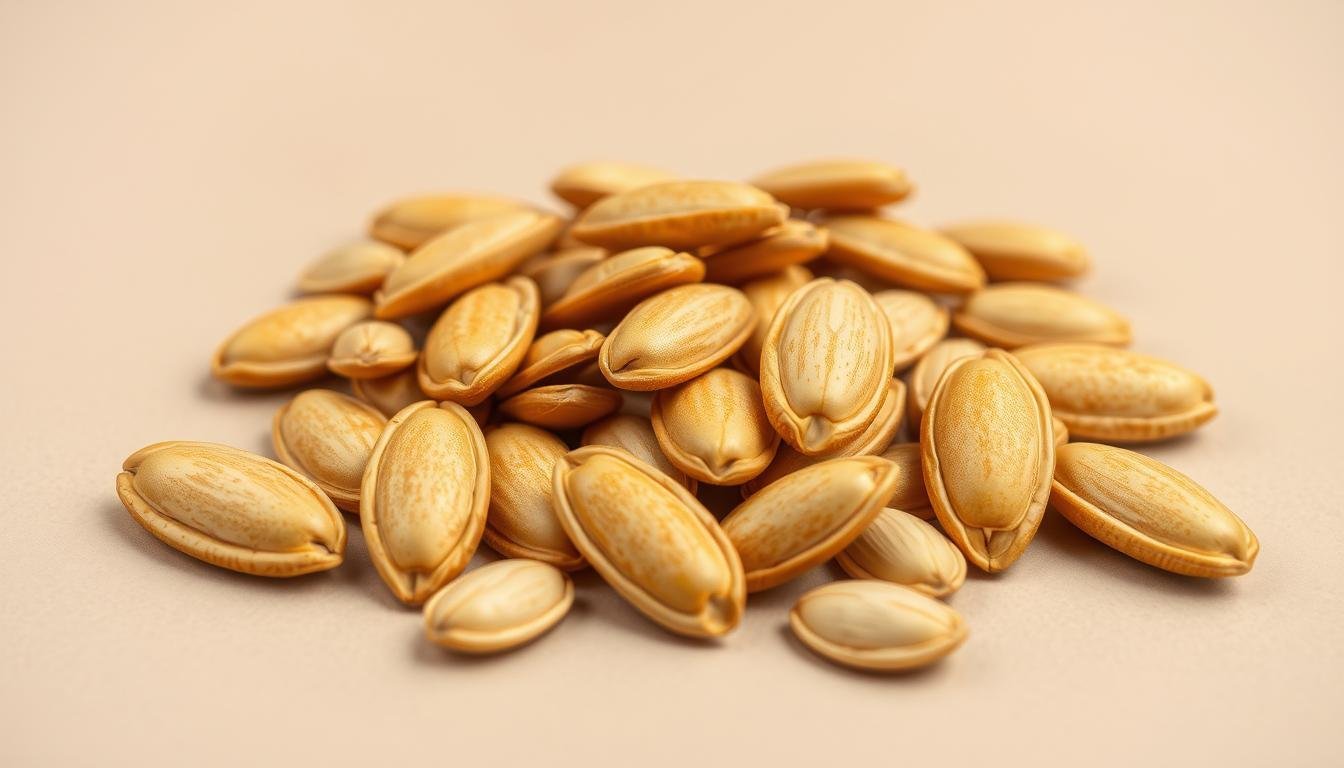Last updated on August 25th, 2025 at 04:32 pm
You might know how good sunflower seeds and pumpkin seeds are on their own. They’re packed with vitamins, minerals, and healthy fats. Sunflower seeds are full of vitamin E, and pumpkin seeds are loaded with magnesium and zinc.
What if you mix these seeds together? It could make them even better for you. People wonder if it’s safe and if it’s good for their health. This article will look into the good stuff in both seeds, if it’s okay to eat them together, and the health perks of this mix.
Learning about the sunflower seeds benefits and pumpkin seeds benefits helps you choose better snacks. Let’s explore how combining sunflower and pumpkin seeds can make you healthier.
Contents
- 1 The Nutritional Powerhouses: Sunflower and Pumpkin Seeds
- 2 Can You Eat Sunflower Seeds and Pumpkin Seeds Together?
- 3 Health Benefits of Combining These Seeds
- 4 Potential Concerns When Eating Mixed Seeds
- 5 Raw vs. Roasted: Best Ways to Consume Seed Combinations
- 6 Delicious Ways to Incorporate Sunflower and Pumpkin Seeds Together
- 7 Conclusion
- 8 FAQ
- 8.1 Are sunflower and pumpkin seeds safe to eat together?
- 8.2 What are the nutritional benefits of sunflower seeds?
- 8.3 What are the nutritional benefits of pumpkin seeds?
- 8.4 Can eating sunflower and pumpkin seeds together cause any digestive issues?
- 8.5 How can I incorporate sunflower and pumpkin seeds into my diet?
- 8.6 Are there any potential allergic reactions or sensitivities to sunflower or pumpkin seeds?
- 8.7 Is it better to eat sunflower and pumpkin seeds raw or roasted?
- 8.8 Can overconsumption of sunflower and pumpkin seeds lead to excessive caloric intake?
- 8.9 How can I roast sunflower and pumpkin seeds at home to maximize their nutritional benefits?
The Nutritional Powerhouses: Sunflower and Pumpkin Seeds
Sunflower and pumpkin seeds are packed with nutrients. They offer many health benefits. Adding them to your diet can be very beneficial.
Sunflower seeds are full of vitamin E. This vitamin protects your cells. They also have healthy fats and protein, making them a great snack.
| Nutrient | Sunflower Seeds | Pumpkin Seeds |
|---|---|---|
| Protein | 6 grams per ounce | 7 grams per ounce |
| Magnesium | 37 mg per ounce | 156 mg per ounce |
| Vitamin E | 7.4 mg per ounce | 0.1 mg per ounce |
Pumpkin seeds are rich in magnesium, zinc, and copper. These nutrients are good for your heart and immune system. Knowing what’s in these seeds helps us see their benefits together.
Mixing sunflower and pumpkin seeds makes a tasty and nutritious snack. This mix can improve your health and happiness.
Can You Eat Sunflower Seeds and Pumpkin Seeds Together?
Wondering if it’s safe to mix sunflower seeds and pumpkin seeds? The answer is yes. They can boost your nutrition when eaten together.
Sunflower and pumpkin seeds are packed with good stuff like healthy fats, proteins, and fiber. Sunflower seeds are full of vitamin E. Pumpkin seeds are rich in magnesium and zinc. Together, they offer a wide range of nutrients.
Eating these seeds together is safe and good for you. They help your heart, digestion, and immune system. But, watch your portion sizes because they’re high in calories and fat.
Here are some tips to enjoy them safely:
- Mix them in moderation, about 1-2 tablespoons per serving.
- Add them to your meals or snacks, such as salads, yogurt, or oatmeal.
- Choose raw or roasted seeds based on your preference, but be aware that roasted seeds may have a higher calorie content.
Adding sunflower and pumpkin seeds to your diet is a tasty way to get more nutrients. It supports your health and well-being.
Health Benefits of Combining These Seeds
When you mix sunflower and pumpkin seeds, you get a big health boost. They give you lots of important nutrients that help your body work right.
Sunflower seeds are full of vitamin E, which keeps cells safe. Pumpkin seeds are packed with zinc, key for a strong immune system. Together, they give you a great mix of nutrients.
These seeds are good for your heart. They have healthy fats, fiber, and antioxidants. These can lower cholesterol and cut down heart disease risk.
Nutritional Highlights
| Nutrient | Sunflower Seeds | Pumpkin Seeds |
|---|---|---|
| Protein | High | High |
| Healthy Fats | Rich in monounsaturated fats | Rich in polyunsaturated fats |
| Minerals | Rich in selenium | High in zinc and magnesium |
Eating sunflower and pumpkin seeds together boosts your immune system. They have vitamins, minerals, and antioxidants. These help fight off infections and keep you healthy.
It’s easy to add these seeds to your meals. Sprinkle them on salads, blend into smoothies, or snack on them alone. Their versatility makes it simple to get their health benefits.
By mixing sunflower and pumpkin seeds, you get the synergistic effects. This mix supports a healthy lifestyle and boosts your nutritional well-being.
Potential Concerns When Eating Mixed Seeds
Eating mixed seeds is usually safe, but it can be risky for some people. Knowing these risks helps you stay safe and healthy.
Allergic reactions are a big concern. Some might be allergic to sunflower or pumpkin seeds. Symptoms can range from mild hives to severe anaphylaxis. If you’re allergic, stay away from these seeds.
Even without allergies, some might feel uncomfortable. For example, digestive issues can happen after eating these seeds.

Eating too many seeds is another issue. Sunflower and pumpkin seeds are high in calories. Eating too much can lead to weight gain or health problems. Watch your calorie intake and eat seeds in moderation.
Here are some tips to enjoy mixed seeds safely:
- Start with small amounts to check for any adverse reactions.
- Be mindful of your overall diet and calorie intake.
- If you have known allergies or sensitivities, avoid consuming mixed seeds or consult a healthcare professional.
By knowing these concerns and taking steps to avoid them, you can enjoy the health benefits of sunflower and pumpkin seeds. This way, you can keep your diet balanced and healthy.
Raw vs. Roasted: Best Ways to Consume Seed Combinations
Choosing between raw and roasted sunflower and pumpkin seeds affects their nutrition and taste. Raw seeds keep their natural nutrients, like enzymes and vitamins, which heat can damage. Roasting, however, makes the seeds taste better and feel crunchier.
But, roasting can also reduce some nutrients. High heat can destroy vitamins and create harmful substances. Roasting at home helps you control the process, reducing nutrient loss.
- Preheat your oven to a low temperature, around 300°F (150°C), to preserve nutrients.
- Spread the seeds in a single layer on a baking sheet to ensure even roasting.
- Roast for about 30-40 minutes, or until the seeds are lightly browned and fragrant.
- Stir the seeds occasionally to prevent burning.
Roasting seeds at home lets you enjoy their flavor while keeping more nutrients. Whether raw or roasted, sunflower and pumpkin seeds are great for your health.
Delicious Ways to Incorporate Sunflower and Pumpkin Seeds Together
Combining sunflower and pumpkin seeds opens up a world of culinary possibilities. You can easily add them to various dishes. Sprinkle them over salads for a crunchy texture and a nutrition boost.
Mixing them into trail mix is another delicious way. Combine these seeds with nuts, dried fruits, and dark chocolate for a tasty treat. This mix is great for snacking on the go or for a quick energy boost.
You can also add them to your baking. Mixing them into bread, muffins, or cookies enhances texture and nutrition. For example, you can mix them into granola or energy bars for a nutritious snack.
Blending sunflower and pumpkin seeds into smoothies is another great option. Combine them with your favorite fruits and yogurt for a nutritious breakfast or post-workout snack. The seeds add a nutty flavor and a boost of protein and healthy fats.
Incorporating sunflower and pumpkin seeds into your diet is easy and versatile. Whether you’re adding them to salads, mixing them into trail mix, baking with them, or blending them into smoothies, you’re sure to enjoy the nutritional benefits and delicious flavors they bring to your meals.
Conclusion
Eating sunflower and pumpkin seeds together can boost your nutrition. They offer healthy fats, protein, and fiber. This mix is great for your health.
Together, these seeds give you a wide range of nutrients. They help your heart, keep you full, and boost your overall health. It’s a win-win for your body.
To get the most from these seeds, try them in different ways. Snack on them raw or roasted. Add them to your favorite dishes. This way, you’ll enjoy their health benefits and live a healthier life.
FAQ
Are sunflower and pumpkin seeds safe to eat together?
Yes, it’s safe to eat sunflower and pumpkin seeds together. They are both nutritious.
What are the nutritional benefits of sunflower seeds?
Sunflower seeds are full of vitamin E, a strong antioxidant. They also have healthy fats and protein.
What are the nutritional benefits of pumpkin seeds?
Pumpkin seeds are packed with magnesium, zinc, and copper. These nutrients are good for your heart and immune system.
Can eating sunflower and pumpkin seeds together cause any digestive issues?
Usually, no. But, watch your portion sizes because they are high in calories and fat.
How can I incorporate sunflower and pumpkin seeds into my diet?
Add them to salads for crunch. Mix them into trail mix for a snack. Use them in baking and smoothies for extra nutrition.
Are there any potential allergic reactions or sensitivities to sunflower or pumpkin seeds?
Yes, some people might be allergic or sensitive. Always watch how your body reacts.
Is it better to eat sunflower and pumpkin seeds raw or roasted?
Raw seeds keep more nutrients. Roasting adds flavor and texture but might lose some nutrients.
Can overconsumption of sunflower and pumpkin seeds lead to excessive caloric intake?
Yes, eating too much can lead to too many calories. So, eat them in moderation.
How can I roast sunflower and pumpkin seeds at home to maximize their nutritional benefits?
Roasting at home helps keep nutrients in. Just spread the seeds on a baking sheet and roast at a low oven temperature.

Hello, I am Bellamy George, a certified nutritionist and food safety specialist from Springfield, IL. With a degree in Food Science, I share research-backed insights on edible foods, seeds, and seafood for safe, informed eating.

